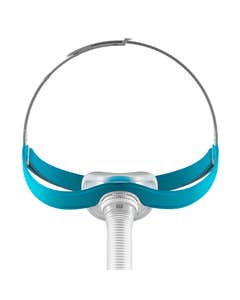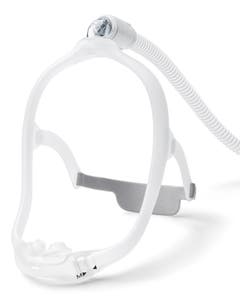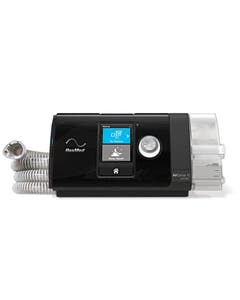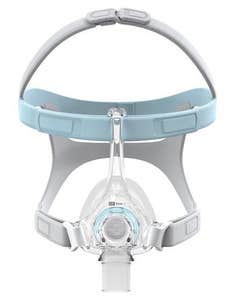How Are Parkinson’s And Sleep Apnea Related?

There may be a link between sleep apnea and Parkinson’s disease. The impact of poor sleep on brain tissue over time may contribute to the early stages of the degenerative condition. Getting a good night’s rest is essential for brain well-being. That means sleep disorders need to be taken seriously to ensure future brain health.
What is Parkinson's Disease?
Parkinson’s disease is a degenerative neurological disorder that affects balance, movement, and coordination. Named for James Parkinson, the English doctor who identified the disease in 1817, Parkinson’s afflicts nearly 10 million people worldwide. 1
The brain disorder is associated with a loss of dopamine-producing nerve cells inside the brain which help regulate movement and mobility.
Since Parkinson’s affects everyone differently, how each patient lives their life with the disease is unique. Parkinson’s patients are best to maintain a positive attitude and stay focused on keeping good health through diet and exercise.
What Causes Parkinson's Disease?
While the loss of these critical nerve cells has been identified as the basis of Parkinson’s disease, no direct cause has been identified. The disease does have some typical patterns.
- Most common in people over the age of 60
- Men are more likely to get the disease than women
- Head injuries, brain inflammation, environmental toxins, and genetics are all suspected causes of the disease
Some research suggests that a healthy lifestyle may help reduce the risk of Parkinson’s disease. However, the best approach is to notice and address the signs as soon as possible. The unique way the disease affects individuals sometimes makes it difficult to diagnose. Doctors will look for tell-tale indicators of the disease.
Signs of Parkinson's Disease
Patients with early signs of Parkinson’s may experience tremors, changes in their handwriting, difficulty walking, poor sleep, changes in voice and posture, and also changes in facial expression. Movement symptoms may start on one side of the body and then gradually affect both sides.
Although there is no test for Parkinson's disease, these early indicators usually lead to closer examination and observation of the patient to determine a diagnosis. Only the typical early signs and other additional indicators clue doctors to the disease.
Other indicators include:
- a loss of sense of smell
- mood changes
- chronic fatigue
- skin problems
- constipation
- dementia, delusions, and hallucinations
- difficulty chewing and swallowing
Identifying Sleep Apnea in a Person with Parkinson’s
While the results are inconclusive, there is strong evidence that sleep apnea may impact Parkinson’s disease. Sleep apnea reduces oxygenation to the brain, which then over time can stimulate a specific protein alpha-synuclein in the blood. This elevated protein level becomes toxic and begins the degenerative process of Parkinson’s in the brain.2
Identifying sleep apnea symptoms in a person with Parkinson’s can help with managing the progression of the disease. Look for these indicators of obstructive sleep apnea.
- Waking up gasping for air at night
- Loud snoring
- Morning headaches
- Drowsiness during the day
- Dry mouth or sore throat in the morning
- Changes in mood and irritability
Why is it Important to Treat OSA in Parkinson’s Patients?
Many of the mental side effects of Parkinson’s disease can be helped by improving sleep. Treating OSA reduces apneas at night and can also reduce many of the daytime symptoms aggravated by not sleeping well.
Sleep apnea treatment can reduce brain fog, mood problems, and also daytime drowsiness that can make Parkinson’s disease worse. Common issues like anxiety and cognitive function also improved with CPAP compliance.
While sleep apnea treatment may not stop the progression of Parkinson’s disease, it can help the patient with improved quality of life while managing the disease.
Where Can I Buy CPAP Therapy Equipment?
The CPAP Shop is an authorized dealer of all CPAP equipment and provides free shipping for all purchases above $99 in the continental USA. Find the best range of Philips and ResMed CPAP Machines and accessories at The CPAP Shop website.
For additional information on various topics concerning sleep apnea and CPAP products, please refer to our blog. It is constantly updated and offers free advice and information. If you’d like to learn more about the quality sleep apnea products we carry, or if you have additional questions, don’t hesitate to call us at (866) 414-9700, or you can contact us through our website.
References
- United Brain Association. Parkinson’s Disease.
- Parkinson’s News Today. Carvalho, Joana. Lack of Tissue Oxygenation from Sleep Apnea Linked to Parkinson’s, Study Suggests April 30, 2019.
There may be a link between sleep apnea and Parkinson’s disease. The impact of poor sleep on brain tissue over time may contribute to the early stages of the degenerative condition. Getting a good night’s rest is essential for brain well-being. That means sleep disorders need to be taken seriously to ensure future brain health.
What is Parkinson's Disease?
Parkinson’s disease is a degenerative neurological disorder that affects balance, movement, and coordination. Named for James Parkinson, the English doctor who identified the disease in 1817, Parkinson’s afflicts nearly 10 million people worldwide.¹
The brain disorder is associated with a loss of dopamine-producing nerve cells inside the brain which help regulate movement and mobility.
Since Parkinson’s affects everyone differently, how each patient lives their life with the disease is unique. Parkinson’s patients are best to maintain a positive attitude and stay focused on keeping good health through diet and exercise.
What Causes Parkinson's Disease?
While the loss of these critical nerve cells has been identified as the basis of Parkinson’s disease, no direct cause has been identified. The disease does have some typical patterns.
- Most common in people over the age of 60
- Men are more likely to get the disease than women
- Head injuries, brain inflammation, environmental toxins, and genetics are all suspected causes of the disease
Some research suggests that a healthy lifestyle may help reduce the risk of Parkinson’s disease. However, the best approach is to notice and address the signs as soon as possible. The unique way the disease affects individuals sometimes makes it difficult to diagnose. Doctors will look for tell-tale indicators of the disease.
Signs of Parkinson's Disease
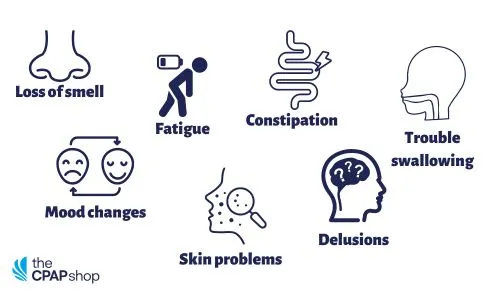
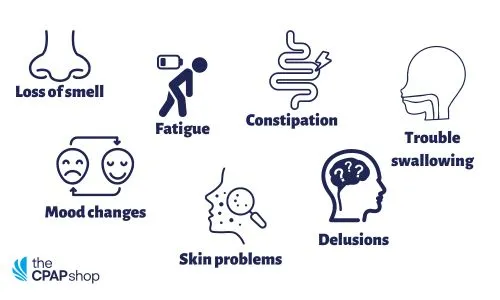
Patients with early signs of Parkinson’s may experience tremors, changes in their handwriting, difficulty walking, poor sleep, changes in voice and posture, and also changes in facial expression. Movement symptoms may start on one side of the body and then gradually affect both sides.
Although there is no test for Parkinson's disease, these early indicators usually lead to closer examination and observation of the patient to determine a diagnosis. Only the typical early signs and other additional indicators clue doctors to the disease.
Other indicators include:
- a loss of sense of smell
- mood changes
- chronic fatigue
- skin problems
- constipation
- dementia, delusions, and hallucinations
- difficulty chewing and swallowing
Can Sleep Apnea Cause Parkinson's Disease?
While the results are inconclusive, there is strong evidence that sleep apnea may impact Parkinson’s disease. Sleep apnea reduces oxygenation to the brain, which then over time can stimulate a specific protein alpha-synuclein in the blood. This elevated protein level becomes toxic and begins the degenerative process of Parkinson’s in the brain.²
Identifying sleep apnea symptoms in a person with Parkinson’s can help with managing the progression of the disease. Look for these indicators of obstructive sleep apnea.
- Waking up gasping for air at night
- Loud snoring
- Morning headaches
- Drowsiness during the day
- Dry mouth or sore throat in the morning
- Changes in mood and irritability
Why Is It Important To Treat Obstructive Sleep Apnea For Parkinson’s Patients?
Many of the mental side effects of Parkinson’s disease can be helped by improving sleep. Treating OSA reduces apneas at night and can also reduce many of the daytime symptoms aggravated by not sleeping well.
Sleep apnea treatment can reduce brain fog, mood problems, and also daytime drowsiness that can make Parkinson’s disease worse. Common issues like anxiety and cognitive function also improved with CPAP compliance. While sleep apnea treatment may not stop the progression of Parkinson’s disease, it can help the patient with improved quality of life while managing the disease.
Where Can I Buy CPAP Therapy Equipment?
The CPAP Shop is an authorized dealer of all CPAP equipment and provides free shipping for all purchases above $99 in the continental USA. Find the best range of CPAP machines, masks, and accessories at The CPAP Shop website.
For additional information on various topics concerning sleep apnea and CPAP products, please refer to our blog. It is constantly updated and offers free advice and information. If you’d like to learn more about the quality sleep apnea products we carry, or if you have additional questions, don’t hesitate to call us at (866) 414-9700, or you can contact us through our website.
Note: This post was originally Published on October 28, 2021, and updated on June 28, 2023, with the latest facts.
References:
United Brain Association. Parkinson’s Disease.
Parkinson’s News Today. Carvalho, Joana. Lack of Tissue Oxygenation from Sleep Apnea Linked to Parkinson’s, Study Suggests April 30, 2019.




